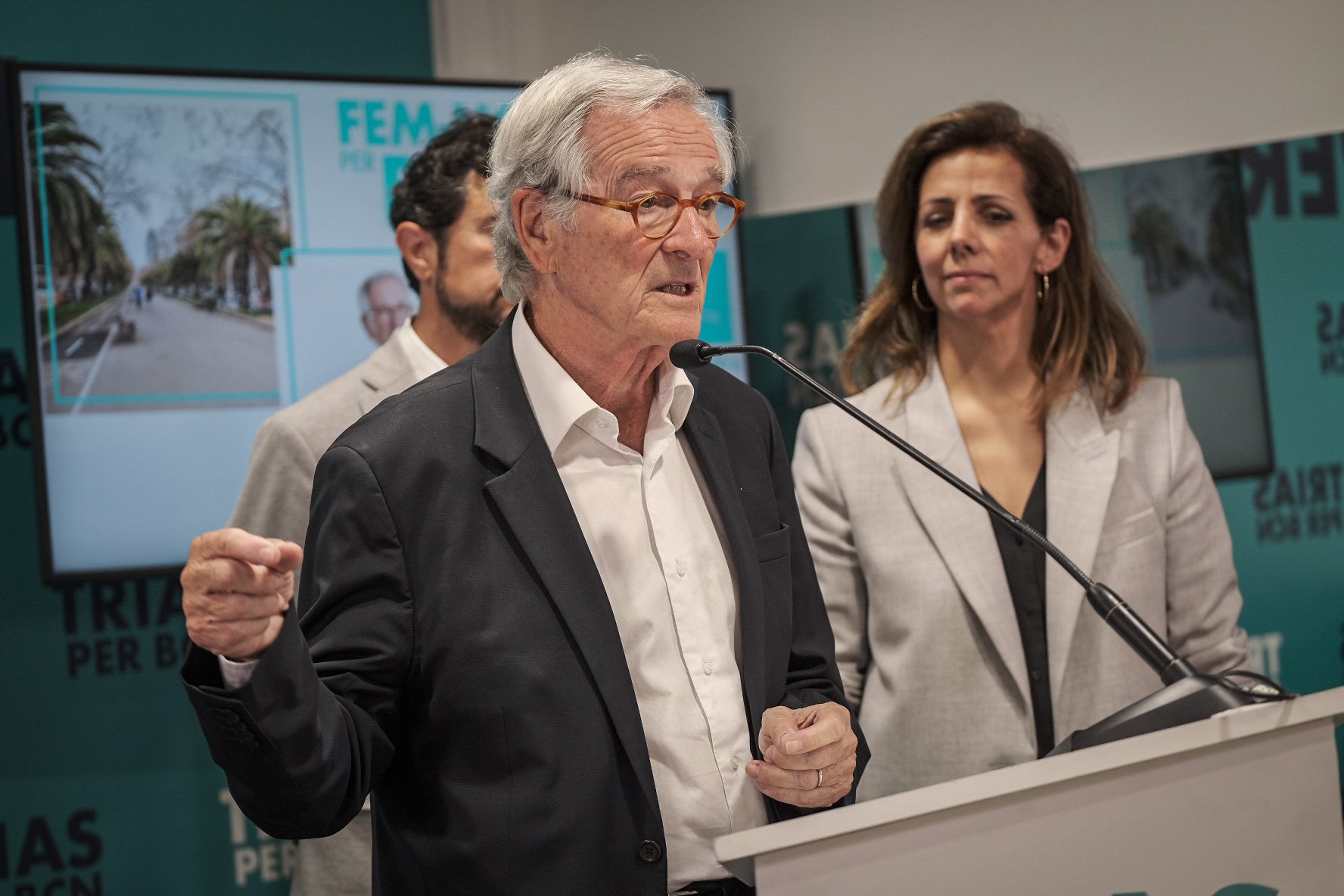Xavier Trias has reiterated throughout the 2023 Barcelona municipal election campaign that mayor Ada Colau's model for urban planning and mobility is a "disaster". For this reason, the candidate has committed himself this Tuesday to an audit of the so-called "green axes" if he manages to lead the city council after this weekend. Trias, accompanied by former Catalan minister Josep Rull, has turned into a defender of the Cerdà plan - that is, the grid format of the Eixample district, named after the engineer who conceived it, Ildefons Cerdà. He has announced that his plan is to halt the superblock projects which seek to pedestrianize and remodel parts of this area, in order "to rethink them rigorously, with dialogue and always seeking the maximum possible consensus". Regarding the audit, which will have a "binding" nature and which, if elected, he plans to carry out during the first year of his mandate, the aim is to study with indicators of the "degree of pollution, cleanliness, security, commercial activity, mobility or increase in housing prices" of these axes to "adapt them to the results obtained" and then to "reverse" those areas which "do not work or distort the original spirit of Cerdà's Eixample".
-
All our coverage in English of the 2023 Municipal Elections
-
Xavier Trias: our articles in English on the Barcelona mayoral candidate
In any case, however, he specified that he will not reverse the changes already made along Carrer Consell de Cent: "The people of this street do not deserve that I now undo it, it will be a success, although it will not be the success that Colau is looking for". In fact, Trias warned of the "gentrification" it will generate. In this regard, however, he did promise to "recover the chamfers" for loading and unloading, a feature of the octagonal Eixample intersections which is partially lost with the remodelling. Trias also spoke about the Via Augusta cycle lane as one of the most conflictive points: "It is a catastrophe, it creates spectacular congestion, it makes no sense."
On the other hand, in terms of mobility, the former mayor of Barcelona reiterated his negative to the construction of the second part of the Diagonal tramway extension, which would connect Plaça Verdaguer with Plaça Francesc Macià. Instead, Xavier Trias opts for electric buses. However, the candidate leaves the door open to a public consultation on the matter: "It's a possibility, I'm not saying it's not". In fact, Trias explained that the "city must be open to consultation" and he cited Swiss capital Bern as an example. Still on transport, the Trias for Barcelona list leader came out in favour of the transfer of the Rodalies trains to Catalan control, "as long as it is accompanied by the appropriate resources and funding, because if not, each transfer makes us more dependent and we are fed up with that." Again, Trias called for Barcelona residents to support him against an "ideological urbanism based on theories of decline and confrontation". "We are wasting time and time is competitiveness", he warned.

The Barcelona of the six great parks and the new Gran Via
For his part, Damià Calvet, number 5 in the Trias candidacy, set out the main axes in urban planning that the project proposes: on the one hand, a "renaturalized" Barcelona, with the impetus of the Barcelona of its "six great parks", which are the Tres Turons, Montjuïc, Besòs, Llobregat, Ronda de Dalt (once the urban motorway is covered over) and the Front Marítim. This 'green' would also be implemented on Avinguda Meridiana, from Trinitat Nova to Glòries, and from Glòries to França station. Along these lines, Calvet also announced that the Trias ticket wants to re-make the city's Gran Via thoroughfare, in a transformation that would follow the same line that Trias made on the Diagonal between Passeig de Gràcia and Francesc Macià. In parallel, they propose "new urban systems" to better connect Besòs and Llobregat and a connection of the Zona Franca promenade and Poble-sec, giving rise to what he called "agile urban planning".
The former minister Josep Rull also attended the press conference to present the Trias proposals for urban planning, mobility and housing and defined the fight against climate change as the "battle of our lives", paraphrasing UN secretary general, Antonio Guterres. Faced with this struggle, he said, "there is the option to ideologize a common cause against some groups, or approach it with dialogue and consensus". "The priority objective is consensus", he emphasized. Along these lines, Rull advocated "sustainable mobility, water resilience and the circularity of the economy" as recipes to achieve this. As a former Catalan territorial minister, he referred to the Rodalies trains, recalling the "extensive" agreement that was reached in 2016: "It is incredible that those who were there calling for this are no longer doing so, both Colau and the PSC no longer speak up for it."

